This sermon was delivered by the Rev. Ryon Price at the Juneteenth Unity Prayer Service held at Broadway Baptist Church, June 4, 2021. Rev. Price (pictured at the right in the picture below), has been Senior pastor at Broadway since 2017.
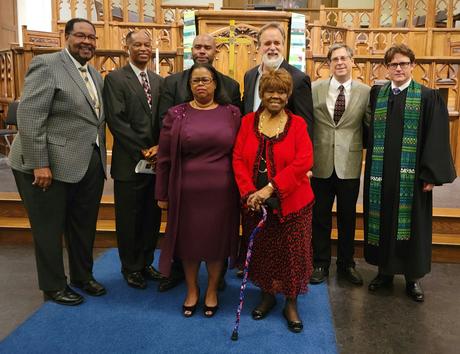
It is an honor to have you all here at Broadway, and to welcome you into this historic sanctuary, the site of one of the first integrated services to take place in a White church in Fort Worth, way back in 1959. Unity is an important part of our mission and vision as a congregation, and today is a fine expression of that vision as we join in singing and praying together in these pews. “How good and pleasing it is when kindred live together in unity!” And how pleasant it must be for all our voices to rise to God’s ears in song, and not just mine alone!
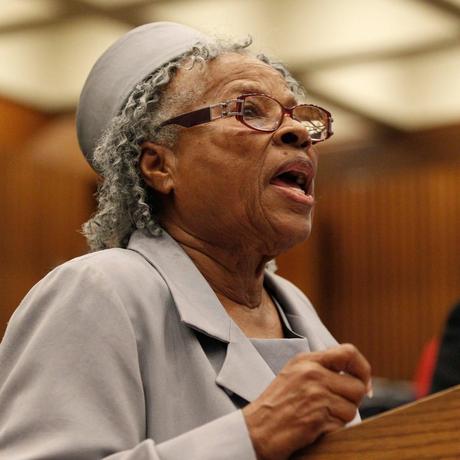
I want you to know that I am a little sheepish about standing before you to speak in my own place today. It’s a little embarrassing, quite frankly. But I understand that this is the custom of the Unity Prayer Service and so, “When in Rome . . .” Plus, it was Ms. Opal Lee herself who asked me to speak – Ms. Juneteenth herself – and if ya’ll think I’m going to tell the Grandmother of Juneteenth “no” in the month of June, ya’ll are crazy. Besides, I needed to get my copy of the new Southern Living signed.
In 1852 Frederick Douglass gave a very famous speech in Rochester, New York titled “What to the Slave Is the Fourth of July?” With all due respect and fondness for Mr. Douglass, this morning I would like to speak on the very challenging, and important subject: “What to the Son of the Slavemaster Is Juneteenth?” It is a provocative question, but one which we must explore.
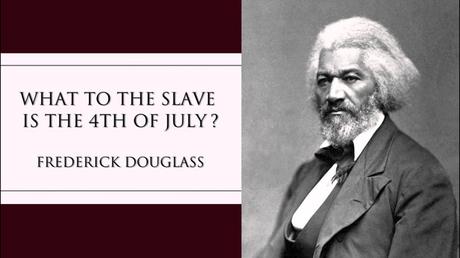
The history was recited earlier. On June 19th, 1865 General Order No.3 was read at Reedy Chapel AME Church in Galveston, TX, conveying the “absolute equality of personal rights . . . between former masters and slaves”.
Now Ms. Opal and Pastor Wilson are each AME. And though AME technically stands for African Methodist Episcopal, I think they can both testify that there is some truth to what my father-in-law, who was also AME, says the letters really stand for: Always Meeting & Eating.
From its inception the AME Church was a place of meeting, and eating, and organizing, and planning, and praying, and praying, and resisting, and preaching freedom. And so the hallowed grounds of an AME Church was a fitting place for Order No.3 to be read, and the spirit of the Emancipation Proclamation delivered.
And we know what it meant to those former slaves, now called “freedmen”. It was a new Exodus. And like the old Exodus, a day of deliverance, whose presence on the page of the calendar was meant to mark a new chapter in the history of humanity, a new cornerstone for a more beloved community, and – in Lincoln’s words – “a new birth of freedom” for our now-born-again America.
That is what Juneteenth meant to the former slave. And it’s what it should have meant to us all.
But there was another spirit still on the loose in America – a spirit of bondage and not of freedom. A spirit for which, Phillips Brooks said at Lincoln’s death, slavery was but a “sacrament” – an outward and visible sign of an inward and invisible soul.
And so, though slavery passed away, its spirit lived on, morphing and shape shifting from that of slavery, to Jim Crow, to over-policing, and all the other past and still-present powers and principalities of White Supremacy which continue to haunt us to this very day.
Faulkner said, “The past is never dead. It’s not even past.” It’s still present. The haunting history is still present. And as James Baldwin put it, “We are trapped in history, and history is trapped in us.”
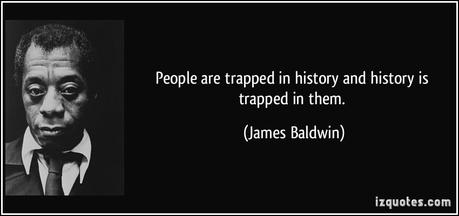
Literally, this is so. The history of our inhumanity is trapped inside of us.
As the brilliant therapist and spiritual healer Resmaa Menakem has written, the history of our racialized trauma and traumatizing over all the generations since 1619 and long before is all hidden and kept in our bodies. It’s in our genetics, and in our epigenetics; and in our DNA. And it’s bone deep. Racism is bone deep. Racialized trauma is bone deep. And like it or not, whether I feel like I should be responsible for it or not, the truth of the matter is I am a son of slavemasters, and the stories and consequences of their sins are every bit as inside of me as are the sins of Adam inside of us all. That is a theological, and sociological, and epigenealogical fact.
And not only are these sins inside us as individuals, but they are inside us as a society. The sins of our forebears are in our systems, and our laws, and our policies, and our practices, and our neighborhoods, and old ways of thinking. They were there in the beginning. And they have been there all along. And that is what is meant when somebody says, “systemic or institutional racism” or “critical race theory”. These are all just really fancy words for history, and for truth.
And it is the truth –the hard, historical truth – that has the power to set us free.
The Broadway people have heard this joke before. Do you know what we call a history teacher in Texas? “Coach”. Now I don’t want to be cynical; I loved my coaches – most of them anyways. And they did just about all teach history. And they loved history. They loved America. But most of them had not yet brought themselves to the place of truly being honest about the hard history of the America they loved. And it is that place of rigorous honesty that we have to come to if we are ever going to come to terms with and truly heal this country’s history and trauma.
And that is why Juneteenth is so important, and why making it a federal holiday is so necessary. Because we not only need a day to remember the end of a war that saw 600,000 souls lost, we also need a day to remember why it was that war had to be fought in the first place. At Gettysburg Lincoln said the War was fought for the sake of “Government of the people, and by the people, and for the people”; and by people, as the Emancipation Proclamation made clear, he meant “all persons”.
In the Emancipation Proclamation Lincoln said that the slaves would free, and – this is important – he pledged that the Office of the Presidency would do everything it took to keep them free. They were to be free not only in word; but free in fact. Lincoln said that the Executive Branch, including the Military, would do everything necessary to assure freedom into perpetuity. And so it began with something called Reconstruction. But Lincoln was killed and the new birth of the nation was stillborn; the Executive Branch lost heart, and so did the Military; and black folks were left to face the lions of mass incarceration, segregation, voter suppression, and all the other racialized tactics used to subjugate a people. The Executive Branch failed to live up to its promises of protection.
But Lincoln was killed and the new birth of the nation was stillborn; the Executive Branch lost heart, and so did the Military; and black folks were left to face the lions of mass incarceration, segregation, voter suppression, and all the other racialized tactics used to subjugate a people.
Ryon Price
And if we think this history is all behind us, we only have to remember how the Executive Branch failed us again on January 6th of this year, when at minimum it was in dereliction of duty in failing to defend the Capitol of the United States, the day after a black man was declared winner of a Southern Senate seat for the first time since Reconstruction.
I know this is difficult subject matter. It makes us uncomfortable. But it is my experience as a pastor that people have to come to a place of real discomfort before they truly get ready to change. They have to be able to see and believe the hard truth, so that then the truth can set them free.
Setting Juneteenth as a national holiday says, “We’re gonna tell the truth. We’re gonna be honest about our past, even if it makes us uncomfortable in the present, because that is what is required of us in order to have a more hopeful future.” The truth shall set us free – both the children of former slaves and the children of former slave masters. And we shall be free indeed.
I do not intend to be long this morning because, as William Sloane Coffin used to say, “Nobody gets saved after 20 minutes.” Amen? Even the rabbi can give an Amen to that!
But before I close, let me bring to mind a Biblical passage that both the Rabbi, and I, and all the rest of us share in common.
It is the story of the brothers’ who sold off their other brother, Joseph, into slavery, and that great scene of mercy and reconciliation at the end of that long and bitter record in the book of Genesis. “Stony the road he trod, and bitter the chastening rod”, but at the end the salt from Joseph’s and his brothers’ tears was for the healing of all Jacob’s children. Reconciliation is a beautiful and hopeful thing.
But before there is reconciliation in the story, let me remind you, there is first truth, a rigorous honesty, where in the 21st verse of the 42nd chapter one of the guilty says to the others, “Alas, we are paying the price for what we did to our brother.”
Juneteenth is not just a holiday for black people. It’s a holiday for us all. Slavery and the sons of slavery – racism and White Supremacy – have traumatized our land. They have wounded the bodies of black and brown people, and left a deep, psychic wound in the souls of us white folks. We, as a community, are paying the price for what we did to our brother. So, we as a community need a day to pause, and to reflect, and to commemorate, and celebrate, and for some of us to repent.
And repentance is a life-long work.
I say this all the time; I live in a fully-integrated household; but I’m still not over my race stuff. The stories, and the teachings, and the traumas are still inside of me. And that means I still have work to do. And I’m doing it. We all have to do it – and keep on doing it. And while we do it, we take heart in what Dr. King used to say: “I ain’t what I ought to be. I ain’t what I’m gonna be. But thank God I ain’t what I was.”
We are in a heavy time right now. We just marked the trial of Derek Chauvin in the murder of George Floyd. And we have our own trial coming up in Fort Worth for the death of Attatiana Jefferson. We pray for our city, and its leaders, and its future leaders. We know we are goin to need good leadership.
And we know that we are going to need each other. We need unity. And in order for us to have unity, we have to be able to trust each other. We’ve got to be able to trust each other not only to tell the truth, but also to believe it when we see and hear it – even if what we hear is hard.
A moment ago I quoted Bill Coffin about nobody being saved after 20 minutes; and know I’m about to miss my altar call. But let me say one other thing that I think it was Coffin who said first. He said, “A true patriot is someone who loves their country enough to tell the truth about it.”
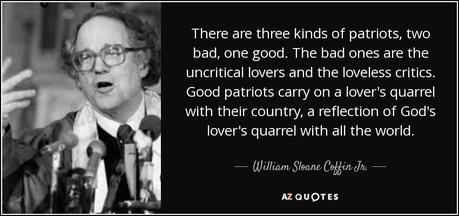
I think Ms. Opal Lee is one of America’s great patriots. She’s also the leader we need now. She is the Grandmother of Juneteenth, and a Grandmother of and for us all. And like any good Grandmother, she is like our Lord, a woman full of both grace and truth.
And that is what is needed for us now. Grace and truth. Confession and forgiveness. Repentence and reconciliation. And we can’t have one without the other.
We can’t have July 4th without Juneteenth! Or peace without justice. Or hope for tomorrow without the hard work set before us today.
We can get there, beloved. We can get to the green pasture called unity. But to get there we have to take the hard path called honesty. Let us walk with one another. As sons, and daughters, and kindred of both former slaves and the sons, and daughters, and kindred of former slave owners, and all the rest of us also, let us promise to walk this path together.
In the name of the Father, the Son, and the Holy Spirit, one God and Mother of us all. Amen.
